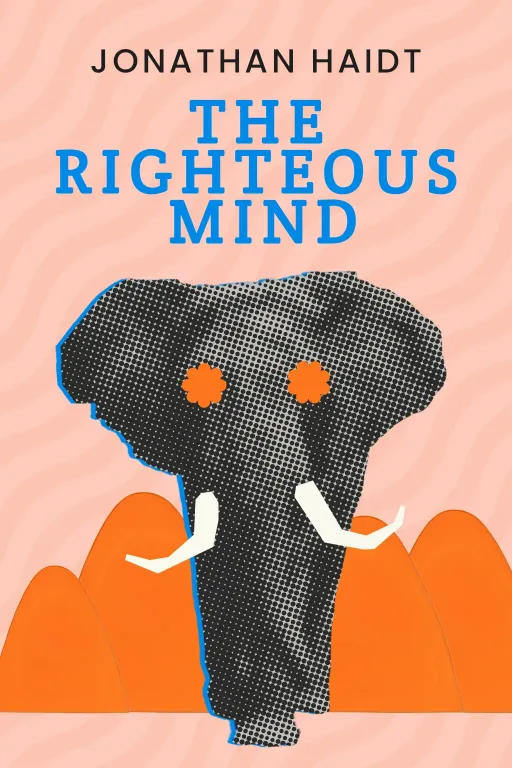
The Righteous Mind
Psychology
Jonathan Haidt
The Righteous Mind: An Eloquent Exploration of Human Morality
Jonathan Haidt's "The Righteous Mind: Why Good People Are Divided by Politics and Religion" embarks on a profound exploration of human morality, elucidating its intricate roots in intuition, emotion, and the evolutionary currents of culture. The central thesis posits that moral reasoning, rather than being a dispassionate arbiter of ethical dilemmas, predominantly functions as a post hoc rationalization, a carefully constructed edifice erected to justify instinctive moral judgments already etched in the subconscious. Haidt masterfully employs moral foundations theory, a framework encompassing care, fairness, loyalty, authority, sanctity, and liberty, to dissect how divergent moral priorities manifest as the seemingly irreconcilable fissures that cleave political and religious landscapes. A crucial tenet advanced is that while morality acts as a potent adhesive, binding individuals into cohesive social units, it simultaneously fosters a form of cognitive provincialism, blinding them to the validity and nuances of alternative viewpoints. By confronting the complex mosaic of moral diversity and examining the reciprocal interplay between intuitive and rational cognitive processes, Haidt's scholarly endeavor endeavors to cultivate mutual comprehension and engender more productive dialogues between groups entrenched in ideological opposition.
In contemporary societies, the chasm separating political and religious factions has widened, leading to impaired cooperation and pervasive animosity. Cataclysmic events, such as the civil unrest that convulsed Los Angeles in the wake of the Rodney King verdict in 1992, expose deep-seated societal fault lines that transcend racial divides, permeating the realms of political and ideological conviction. King's poignant plea, "Can we all get along?" continues to resonate, encapsulating the enduring struggle to achieve unity amidst the forces of polarization. "The Righteous Mind" seeks to illuminate these divisions through the discerning lens of moral psychology, asserting that a deeper understanding of human moral intuition can unlock pathways toward constructive dialogue and reconciliation. By unraveling the complex mechanisms underpinning human morality, Haidt seeks to address the societal schisms that obstruct collaboration. Understanding how our moral instincts mold our perceptions opens avenues for understanding and respecting others' perspectives, irrespective of deeply ingrained differences.
Haidt elucidates the inherent potential of our moral compass, imbued with a sense of justice and virtue and often laced with fervor that can skew our perception. He illustrates the landscape of contemporary politics, highlighting the potential danger of competing ideologies devolving into hostility. He underscores the essential need for a balanced world that allows for moral perspectives that coexist without coercive enforcement. "The Righteous Mind" unfolds in three interdependent parts, each expounding upon a fundamental principle of moral psychology. Part I delves into the primacy of intuition over strategic reasoning, highlighting the metaphor of the mind as a rider on an elephant. Part II broadens the scope, asserting that morality extends far beyond mere harm and fairness. Finally, Part III elucidates the binding and blinding nature of morality, acknowledging the extraordinary altruism and community spirit that can simultaneously foster moral myopia when confronting divergent belief systems.
Within the book, Haidt argues that intuition precedes strategic reasoning, and that the mind should be understood as a rider, representing conscious reasoning, on an elephant, the subconscious impulses. The rider, despite its capacity for reasoned thought, emerges merely as a spokesperson for the elephant's prior conclusions. Haidt asserts that moral reasoning is frequently post hoc, serving to justify decisions already made by intuitive processes. This metaphor dictates that to influence a discussion, one must understand the intuitive, and not solely the rational.
Furthermore, Haidt argues that morality encompasses more than harm and fairness and incorporates a range of moral intuitions that are culturally and socially bound. Haidt also argues that individuals risk becoming ensnared in moral blindness toward other moral frameworks that do not share our fundamental beliefs. The culmination of moral foundation unfolds through this interplay of competition and cohesion. Haidt suggests that to engage with these intricacies of our "righteous minds" is not merely an academic endeavor, but a personal exploration of our shared human experience.










